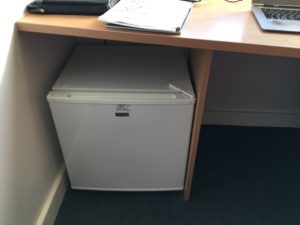5 Things Students with Special Needs Must Know Before Studying Abroad with IFSA
The prospect of studying abroad might be quite daunting especially if you are not sure that you will get support and help that you need. I am here to tell you that with a good amount of research and timely communication with IFSA staff, you should be able to avoid possible problems and get the most out of your study abroad experience. Here are a few things about IFSA that you might have not known, which I learned from an interview with Richard Hull, Assistant Resident Director at IFSA.
IFSA events

One of the things that I was really worried about when I was going to attend welcome dinner by IFSA was whether there would be any meal options available for students that do not eat pork. Upon arrival, I was pleasantly surprised to find out that at IFSA events, you are given an option to choose your food package. It was great news for me as I do not eat certain things (like pork) for religious reasons. According to Richard Hull, if you want to be sure that your dietary needs are met, it is important that you submit a medical questionnaire to address your concerns and dietary restrictions.
Academic and residential support
For visually and audibly impaired students, arrangements can be made so that you are sat in front seats in lectures. Although generally you should be able to sit wherever you want, and front seats are usually free, it is good to have extra assurance that IFSA can help to make sure that you are sat in a place that is suitable for your needs. Moreover, at Queen Mary University of London, all lectures are recorded and can be viewed later at your own convenience, which is great when you are studying for your exams and want to be sure that you did not miss anything important.
For students that need to take medications, Richard Hull suggests that you bring a good supply of medications from home, as some of them might not be available in your host country. If your accommodation does not already have fridges, they can be provided if you have a need to store medications.
For students with test anxiety, IFSA can help make extension arrangements depending on university policies. Generally, if you make a request and communicate with IFSA as well as your host university in a timely manner (i.e., months before you arrive on site), you should be able to get most academic accommodations you need.
If you have a Mobility Impairment
Upon arrival in your host city, you can be provided with a mobility facilitator at the hotel if there is a need for one. Additionally, IFSA will make sure that your host school will assist you in finding a room that is suitable for your needs with good showers. Scooters and wheelchairs can also be provided, so it is important that you stay close in touch with the school accommodation office.
Medications

When it comes to medications, Richard Hull says that it is crucial that you plan ahead and find out whether your medications are available in your host country. If they are not available, you might want to bring them with you. Otherwise, there might be some alternatives in local pharmacies. However, some of them do require prescriptions which you can only get from local doctors. IFSA can be helpful in finding a good one based on your needs, as it has connections with private clinics in London.
Most importantly
According to Richard Hull, you have to stay open-minded, get the most information about the place you are going to and stay in touch with the IFSA office. While IFSA staff can do everything they can to help you, it is important that you understand that some environments might not be the best fit for your needs. So it is important that you stay open-minded when choosing a school to attend.
Bakdaulet Baitan is an economics major at Kenyon College and studied abroad with IFSA-Butler at Queen Mary University of London in 2019. He is an international correspondent for IFSA-Butler through the Work-To-Study Program.
